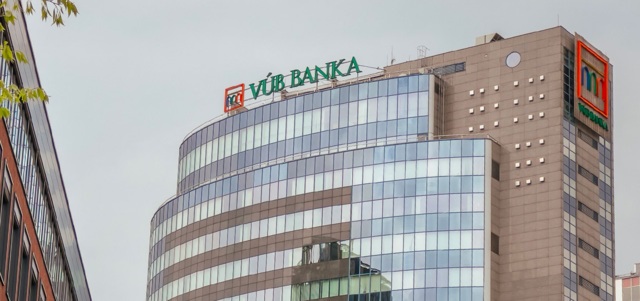
Slovakia gets back on track
The country is showing signs of recovery, thanks to government intervention and a strong labour market. But the supply chain remains an issue.
Hazel Davis
30/11/2021
In common with most countries, Covid-19 brought considerable restrictions to Slovakia. Economic and social life slowed significantly, and in some sectors things ground almost to a halt.
However, in the third quarter of 2021 the country’s GDP appeared to be approaching the pre-pandemic high of late 2019. Annual GDP growth could exceed 4% in 2021 and even accelerate further next year, thanks to new investment from European Union funds and strong growth in foreign demand from the euro area.
This was largely due to summer’s recovery in segments such as retail, restaurants, accommodation, culture and sport. This is no surprise, says Alexander Resch, CEO and chairman of the management board at VUB Banka: “As the pandemic has got under control, the economy has kicked back and people have started to consume and produce.”
“Automotive production is slowing down significantly because we just can’t ensure a constant supply”
Alexander Resch, CEO and chairman of the management board, VUB Banka

What this means, however, is that the country is facing a supply-chain crisis. “In Slovakia, we concentrate heavily on the automotive sector,” says Resch, “but we are missing automotive chips and production is slowing down significantly because we just can’t ensure a constant supply.”
Unlike Croatia, for example, which relies heavily on tourism, Slovakia is a big exporter. “If we didn’t have this supply-chain bottleneck we’d be managing better,” says Resch, “but we are so reliant on industry.” Energy is also an issue, with prices rising dramatically.
However, the labour market is exceeding expectations. “Even before the crisis, we were carefully looking at the unemployment rate, afraid we’d see something like the financial crisis of 2010. But we didn’t,” says Resch. This, he says, was mostly because the government intervened “in a timely manner”. He says the government looked to Germany for inspiration, and used subsidies to encourage companies not to lay off staff. “Unfortunately,” he adds, “there are so many open positions now, we’re probably going to start to suffer a skills shortage.”
The bank is playing a clear role in this economic transformation, says Resch: “We are active in various different platforms, bringing together industry and policymakers to discuss what needs to be done – typically in the educational system, simplification of public administration and digital infrastructure.”
The bank has also developed a Strategic Competency Index, which helps compare Slovakia to other countries to understand areas of concern. Resch says: “We clearly see that GDP growth of 3% to 5% will be not sustainable. And this is what we want to prevent – so we are looking for solutions together within the ecosystem.” The bank is one of the market leaders in all relevant segments in Slovakia, says Resch. “We recognise that many, many peers are looking at what we are doing and how we are moving. So everything we do is from a market-leader position.”
To that end, the bank’s plans focus on optimising return on equity. “We know our asset quality is stable and our productivity is best in class,” says Resch. “A real issue in terms of income is how to make our business model sustainable – especially as we are operating in the euro area. We need to work on our operating income.
“If we want to get rid of the dependency on the net-interest income, which is driven by Euro interest rate levels, we need to work significantly on our fee-based business – and making it a stronger component than it is now.
“Our peers are looking at what we are doing, how we are increasing productivity, and trying to copy what we are doing.”
This, he says, means constantly and systematically reviewing the situation, creating transparency, checking what brings value, reallocating resources and simplifying processes. This “requires constant dialogue with all the organisational units involved”.
VUB has achieved good returns in fee income and excellent results in trading revenues. At the same time, it has maintained efficient operations and made structural savings in administrative costs – with the result that the cost-to-income ratio has improved by 67 basis points. The transformation of the bank levy has also had an impact on profitability.
A huge topic for the bank is digitisation. “This helps us standardise and optimise,” says Resch. “For all the low-added-value activities or repetitive activities, there is no sense in using brains and potential, so we will move to robotisation.”
VUB is one of the most important co-financiers of property construction. Prices in real estate have been driven up by the slow implementation of projects, high commodity prices and especially high demand due to cheap mortgages. The debate about rental flats revolves around how many to build and how to finance them in an economically sustainable way.
Our peers are looking at what we are doing and how we are moving so everything we do is from a market leader position – Alexander Resch,
CEO and chairman of the management board, VUB Banka
Meanwhile, the market seeks to regulate demand through lower supply and rationalisation measures, while encouraging the construction of modular, flexible buildings that adhere to the principles of long-term sustainability. There is sufficient liquidity and interest in real estate projects on the market, making office buildings a promising segment.
ESG (environmental, social and governance) concerns are also high on the list. “We are one of the most vocal on this in our market,” says Resch, “and we are pushing a lot to bring this topic forward.
“There are a lot of things to be done to meet the climate goals, and we are working with various ministries to make that happen for our country.”
Financial inclusion is also a consideration. “There’s a huge risk that we are going to face energy poverty,” Resch says, “and here we need discussions with ministries, but also with regulators.”




